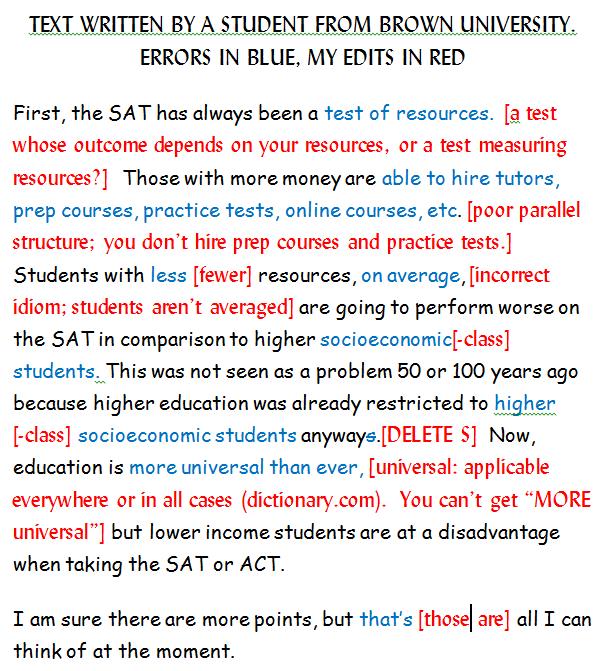DeLoggio Achievement Program
Selection of and Preparation for College and Professional Programs
Bad Sentences
An area that might concern the admissions committee is the apparent inconsistency of the grades in my transcript, especially during my sophomore year. The Achilles heels throughout my academic career have been my difficulty with succeeding in quantitative subjects and my unwillingness to ask for help. Despite my chronic struggles with numbers, during my first two years of college, I was too stubborn to let people help me with quantitative classes. It showed as I took on multiple economics and accounting classes simultaneously during my sophomore year and saw my two worst semesters in college.
People who use big words to explain weaknesses in their file are usually afraid that someone will think they're stupid, and are trying to prove they're not. When a four syllable word is the most appropriate, use it; when a single syllable works, show that you're secure enough to use that.
People who cannot resist the urge to add one more sentence simply because the space exists tend to forget that that sentence may not be as important to the admissions officer as it is to them. Here's an example:
- Version 1: "In 1969 I ran my right hand through a shredder. It took six operations over two years to repair the damage; the result was functional, but not perfect. Fortunately, I am left-handed."
- Version 2: "On October 23, 1969 at 2:15 p.m., I suffered an accident in which my hand was caught in a wool carding machine, resulting in severe lacerations to the second, third and fourth fingers as well as the top third of the palm of my hand. A series of six operations, including several Z-plasty's, two skin grafts, and an attempted (but failed) nerve reconnection, were conducted over the course of the next two years. With subsequent intervening physical therapy I was able to regain almost full use of my hand. The resulting physical limitations, however, are minimal, since the hand in question is not my dominant one."
Both paragraphs say the same thing. The first says it more simply, and without the two grammatical mistakes in the second ("were" instead of "was" after "series," and the redundant or contradictory phrase "subsequent intervening").
[I thought about including pictures of the hand and machine, but decided it wasn't professionally appropriate.]
How can I be more eloquent in my writing?
Many people think that writing and writing essays aren't the same thing, but writing is a skill unto itself, regardless of topic. Essays have an assigned topic; the topic may have been assigned by you, or by the program to which you are applying, but the content is fully as important as the structure and style.

Writing itself, however, can be persuasive or objective; entertaining or educational; philosophical or whimsical. Each requires the mastering of different skills, and the consciousness of the intended result in every choice of sentence, word, even punctuation mark. So I will discuss how to write essays – personal statements, statements of purpose, diversity statements, explanations of problems, and choices of programs or schools. But this section is about writing as an art unto itself.
| Copyright | Take me to Home Page |